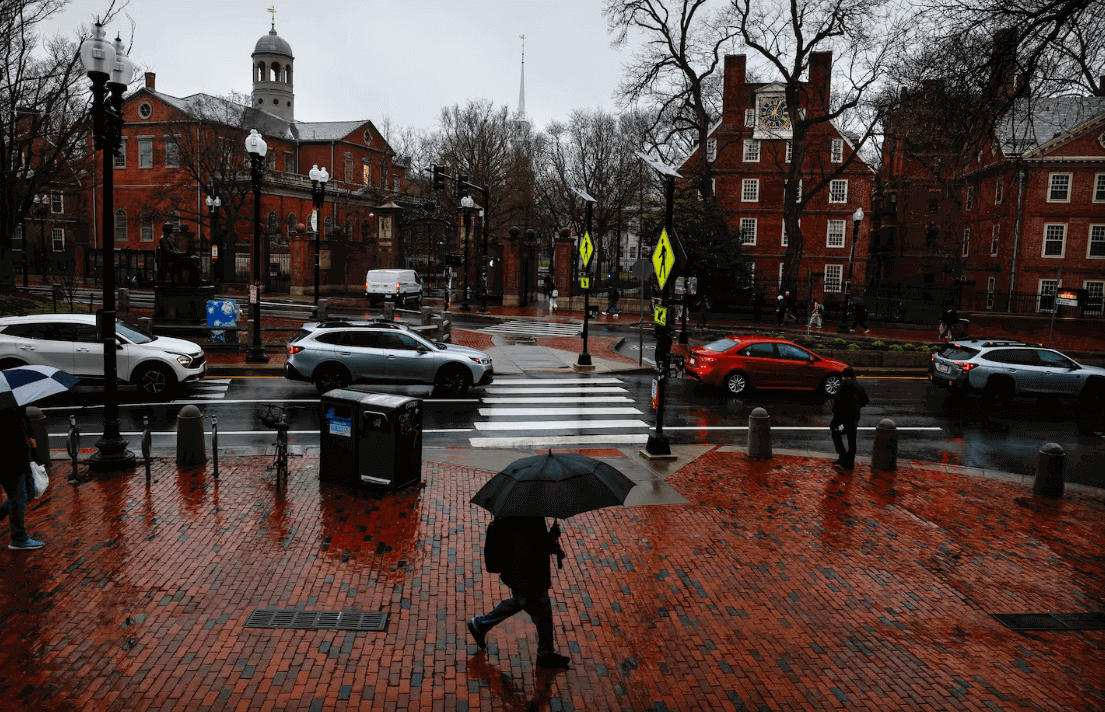哈佛大学对特朗普的回应保持沉默,越来越多的人呼吁哈佛大学对特朗普采取立场

【中美创新时报2025 年 4 月 9 日编译讯】(记者温友平编译)当哈佛大学领导层考虑如何回应特朗普政府提出的一系列要求,以打击其认为校园内猖獗的反犹太主义时,越来越多的知名人士呼吁哈佛大学坚持立场。《波士顿环球报》记者希拉里·伯恩斯对此作了下述详细报道。
许多学生、教职员工和杰出校友认为,哈佛大学拥有雄厚的财富和全球卓越的声誉,有义务抵制许多人认为的对学术自由的前所未有的威胁。
哈佛大学毕业生、美国众议员塞思·莫尔顿周一批评“哥伦比亚大学”等大学“试图与特朗普政府达成交易”。
他在塔夫茨大学的一次活动后告诉记者:“坦率地说,哈佛大学拥有世界上最大的捐赠基金,应该带头做正确的事情。”
哈佛大学周一首次公开表示,其领导层至少正在为可能失去联邦资金做准备,并借入了7.5亿美元。其发言人杰森·牛顿表示,哈佛大学正在为“一系列财务状况”做准备。
牛顿说:“哈佛大学正在评估推进其学术和研究重点所需的资源。”
然而,令哈佛社区许多人懊恼的是,该大学并没有像布朗大学和普林斯顿大学那样全力承诺维护学术自由,也没有像一些教授建议的那样,向法院要求特朗普政府遵循 适当的程序来处理涉嫌违反民权法的行为。
据学生报纸《哈佛深红报》报道,哈佛大学最高管理委员会周末举行了例行会议。哈佛大学发言人拒绝就会议内容发表评论。校监委员会成员菲奥娜·希尔周一在接受WGBH采访时表示,各机构需要齐心协力抵制特朗普。
希尔说:“你不能孤军奋战,因为你会被击退。”
甚至包括前校长劳伦斯·萨默斯在内的一些过去一年对哈佛大学最严厉的批评者也谴责特朗普对哈佛大学和其他大学的攻击。
校园里的一些人呼吁谨慎,称现在挑战学校管理层还为时过早。
“如果特朗普政府的行为违法,那么在法庭上抵制,甚至集体抵制,都是完全合理的,”哈佛大学法学教授诺亚·费尔德曼说。“大学拒绝遵守民权法是错误的。”
上周,政府宣布拨款审查后,哈佛大学校长艾伦·加伯向校园社区发表讲话,表示绝不关闭任何大门。他表示,哈佛大学将保护社区和学术自由,同时也表示,学校将“与联邦政府打击反犹太主义特别工作组的成员合作”。
自周四确认收到特朗普政府的要求以来,该大学尚未发表进一步评论。
东北大学前校长理查德·弗里兰 (Richard Freeland) 表示,此事风险极高,不仅对哈佛大学而言——哈佛大学及其附属医院(包括波士顿儿童医院、麻省总医院布莱根分校和贝斯以色列女执事医疗中心)的研究获得了近 90 亿美元的联邦资金——而且对整个高等教育部门而言也同样如此。
“现在哈佛校长、领导层和董事会肩负着多么沉重的负担,”弗里兰说。“众所周知,哈佛是美国乃至世界顶尖大学。哈佛的反应将对整个行业产生影响。”
哈佛大学的要求包括 终止多元化项目、实施“择优录取”的招生和聘用制度、与联邦移民局合作以及修改学生纪律处分程序。特朗普政府声称这些措施将有助于打击反犹太主义,但并未设定回应的最后期限。
一些人认为,哈佛面临的困境与特朗普政府针对的大型律师事务所有相似之处。一些律所已与政府达成协议以挽救其业务;另一些律所则在法庭上与政府抗争,或向政府提供支持。
“抵制这种现象的唯一方法是建立一个由大学和律师事务所组成的广泛联盟,但目前为止这还没有实现,”人权观察组织前负责人、哈佛大学肯尼迪学院研究员肯尼斯·罗斯最近在剑桥的一次活动上表示。“我们需要鼓励这样做。”
对哈佛大学来说,接受某些行政指令的痛苦会小于接受其他指令。例如,在最高法院于2023年裁定终止大学招生中基于种族的平权行动后,哈佛大学不再考虑申请者的种族因素,因此可以推测,它已经遵守了特朗普政府择优录取的要求。(哈佛大学和其他大学在该裁决后表示,他们将采取其他策略来促进校园多元化——如果他们同意特朗普的命令,这些努力可能会受到审查。)
哈佛大学教育研究生院前院长、教育经济学教授布里奇特·朗 (Bridget Long) 表示,其他要求,包括要求大学终止 DEI 项目,已经引发“人们对正在受到威胁的事情产生极大的困惑和担忧”。
朗说:“哈佛大学非常重视质量并保持高标准——这是该机构的核心价值观。”
哈佛大学法学院教授尼古拉斯·鲍伊称这封索赔信“非法且无法无天”,并补充说,目前尚不清楚取消 DEI 或与国土安全部官员全面合作究竟意味着什么。
如果哈佛同意这些条件,又如何能确定校方不会提出更多要求呢?
“哈佛真的面临着敲诈,而且是无止境的敲诈,”鲍伊说。“所以,哈佛如果此刻就范,就等于给自己埋下伏笔,让自己在下周面临同样的处境。”
哈佛大学访问学者、正在普林斯顿大学休假的哈利勒·纪伯伦·穆罕默德 (Khalil Gibran Muhammad) 表示,一些政府命令的含糊性质“最终可能对哈佛大学构成更大的威胁,因为很难确切知道什么才能取悦这些人”。他还担心,如果哈佛大学屈服,他多年来在肯尼迪学院教授的种族课程,以及其他“讨论种族和种族主义、殖民主义或压迫历史”的课程,都可能受到牵连。
“如果哈佛承认政府有权提出这些要求,并试图满足他们的期望,那么人们可以预见,某些课程以及面向学生和教职员工的项目将被彻底取消,这些项目旨在支持哈佛大学的各种附属机构,”穆罕默德说。“这将创建一个新的标准,所有私立大学基本上都可以选择遵守。”
哈佛大学二年级学生海伦娜·杰克逊表示,她担心学校会屈服,而那些为边缘群体学生创造机会和“空间”的DEI项目将因此受到影响。另一方面,她在最近去哈佛科学中心上课途中接受采访时表示,作为一名物理专业的学生,她担心失去联邦研究经费。
杰克逊说:“如果没有(DEI 项目),我担心哈佛大学将走上错误的方向。”
哈佛大学计算机科学教授、哈佛大学反反犹太主义和反以色列偏见总统工作组成员博阿兹·巴拉克 (Boaz Barak) 表示,哈佛大学应该做出改变,确保犹太学生和以色列学生免受偏见和骚扰,“无论联邦政府是否要求这样做”。
巴拉克说:“与此同时,大学应该拒绝不符合法律的干涉,并应该向任何被行政部门针对的学生或其他学者提供法律支持。”
教职员工似乎普遍持保留态度;最近,超过 800 名哈佛大学教授签署了一封信,呼吁哈佛大学领导对特朗普采取更强硬的态度,包括要求他们“公开谴责对大学的攻击”、“依法抗辩并拒绝遵守威胁学术自由和大学自治的非法要求”,并领导大学和校友联盟反对这些攻击。
其他高等教育和非营利组织的领导者也在密切关注,其中一些人已经发表了讲话。卫斯理大学校长迈克尔·罗斯在《纽约时报》的一篇专栏文章中写道,特朗普以反犹太主义的名义对高等教育的攻击“对他们声称要帮助的人构成了直接威胁”。
约翰·帕尔弗里是约翰·D·和凯瑟琳·T·麦克阿瑟基金会的主席,也是美国最大的慈善机构之一,也是哈佛大学的校友。他表示,他担心作为美国人的基本前提,包括对言论自由的保护,正受到威胁。
“我们决定,我们不想在美国有国王,”帕尔弗里说。“我们需要紧急地、以道德的清晰度发出声音——‘那不是我们想要生活的国家。’”
《波士顿环球报》工作人员马特·斯托特 (Matt Stout) 和通讯员内森·梅特卡夫 (Nathan Metcalf) 对本报道亦有贡献。
题图:一名行人穿过剑桥的哈佛校园。 图片:Craig F. Walker/《波士顿环球报》员工
附原英文报道:
Calls are growing for Harvard to take a stand against Trump after university’s muted response
By Hilary Burns Globe Staff,Updated April 9, 2025, 5:52 a.m.
A pedestrian passes Harvard Yard in Cambridge.Craig F. Walker/Globe Staff
As Harvard leaders consider how to respond to a list of demands from the Trump administration to combat what it views as rampant antisemitism on campus, a growing chorus of high-profile voices is calling on the university to stand its ground.
Many students, faculty, and prominent alumni are arguing Harvard, with its vast wealth and global reputation for excellence, has the obligation to stand against what many view as an unprecedented threat against academic freedom.
US Representative Seth Moulton, a Harvard graduate, on Monday criticized universities “like Columbia” for “trying to make deals with the Trump administration.”
“Harvard, frankly, with the biggest endowment in the world, should lead the pack doing the right thing,” he told reporters after an event at Tufts University.
Threats to Harvard funding, detained international students draw 200 protesters to campus
The university Monday gave the first public indication its leaders are at least preparing for the possibility of losing federal funding by borrowing $750 million. Spokesperson Jason Newton says Harvard is preparing “for a range of financial circumstances.”
“Harvard is evaluating resources needed to advance its academic and research priorities,” Newton said.
Still, to the chagrin of many in the Harvard community, the university has not issued full-throated commitments to preserving academic freedom, as Brown and Princeton universities have, nor has the nation’s oldest college turned to the courts to demand the Trump administration follow the proper procedures for alleged violations of civil rights laws, as some professors have recommended.
The university’s top governing boards met over the weekend for a regularly scheduled meeting, the student newspaper the Harvard Crimson reported. A Harvard spokesperson declined to comment on the substance of the meeting. Fiona Hill, a member of the university’s Board of Overseers, said in an interview with WGBH Monday that institutions need to collectively push back against Trump.
“You can’t just stand alone because you will get picked off,” Hill said.
Even some of the university’s harshest critics in the past year, including former President Lawrence Summers, have denounced Trump’s attacks on Harvard and other universities.
Some on campus urge caution, saying it’s premature to challenge the administration.
“If the Trump administration’s actions are unlawful, it’s entirely appropriate to resist them in court, and even to do so collectively,” said Harvard law professor Noah Feldman. “It would be wrong for universities to refuse to comply with civil rights laws.”
In a message to the campus community after the government’s funding review was announced last week, Harvard president Alan Garber closed no doors. He said Harvard would protect its community and academic freedom but also that the university would “engage with members of the federal government’s task force to combat antisemitism.”
The university has not commented further since confirming it received demands from the Trump administration Thursday.
The stakes are enormously high, not only for Harvard — which has nearly $9 billion in federal funding on the line for research within Harvard and at affiliated hospitals, including Boston Children’s Hospital, Mass General Brigham, and Beth Israel Deaconess Medical Center — but also for the entire higher-education sector, said Richard Freeland, a former president of Northeastern University.
“What a crushing burden is now placed on the president and the leadership of Harvard and the board,” Freeland said. “Everybody knows that Harvard is the top university in the country, and really in the world. How Harvard reacts is going to have implications for the whole industry.”
The administration’s demands include ending diversity programs, implementing “merit-based” admissions and hiring practices, cooperating with federal immigration authorities, and changing student disciplinary procedures. The Trump administration, which contends the measures will help combat antisemitism, did not give Harvard a deadline to respond.
Some see a parallel between the dilemma facing Harvard and major law firms targeted by the Trump administration. Some firms have made deals with the administration to save their businesses; others are fighting the government in court, or offering support to them.
“The only way to resist this is to build a broad coalition of universities, of law firms, which so far has not happened,” Kenneth Roth, the former head of Human Rights Watch and a fellow at the Harvard Kennedy School, said at a recent event in Cambridge. “We need to encourage that.”
Some of the administration’s directives would be less painful for Harvard to agree to than others. The university, for example, no longer considers the race of applicants after the Supreme Court ruled in 2023 to end race-based affirmative action in college admissions, so presumably it is already complying with the Trump administration’s demand for merit-based admissions. (Harvard and other universities after the ruling said they would use other strategies to foster campus diversity — efforts that could come under scrutiny if they assented to the Trump orders.)
Other demands, including that the university end DEI programs, have generated “a great deal of confusion and concern about what is being threatened,” said Bridget Long, professor of education and economics and former dean of the Harvard Graduate School of Education.
“Harvard cares deeply about quality and maintaining high standards — these are core values of the institution,” Long said.
Nikolas Bowie, a law professor at Harvard Law School, called the demand letter “illegal and lawless,” adding that it seems unclear what, precisely, eliminating DEI or fully cooperating with Homeland Security officials would entail.
And if Harvard agrees to the conditions, how could it be sure the administration would not send more demands?
“Harvard just really is facing extortion, and it’s extortion without limit,” Bowie said. “So for Harvard to comply in this moment would just set itself up for being put in the exact same present next week.”
The vague nature of some of the administration’s orders may be even “more threatening to Harvard in the end, simply because it’s hard to know exactly what would please these people,” said Khalil Gibran Muhammad, a visiting scholar at Harvard who is on sabbatical from Princeton University. He also fears classes like the one he taught for years at the Kennedy School about race, and others that “discuss the history of race and racism, or colonialism, or oppression” could be implicated if Harvard capitulates.
“If Harvard were to accept that the government has a right to make these demands and then attempt to meet their expectations, one would then expect a complete erasure of certain curricula, and of the student-facing and staff-facing programs meant to support a wide variety of affiliates at Harvard University,” Muhammad said. “It would create a new standard for which every private university would essentially have a choice to fall in line.”
Helena Jackson, a Harvard sophomore, said she is afraid the university will capitulate, and DEI programs that create opportunities and “spaces for students from marginalized communities” will suffer as a result. On the other hand, she said in a recent interview as she walked to class in the Harvard Science Center, as a physics student, she fears the loss of federal research funding.
“Without [DEI programs], I worry Harvard will start heading in the wrong direction,” Jackson said.
Harvard should make changes to ensure Jewish and Israeli students are free from bias and harassment “regardless of whether the federal government demands them or not,” said Boaz Barak, a Harvard computer science professor and a member of the university’s presidential task force on combating antisemitism and anti-Israeli bias.
“At the same time, the university should be refusing interference that does not accord with the law, and should be providing legal support to any students or other scholars that are targeted by the administration,” Barak said.
The reservations among faculty appear to be widespread; more than 800 Harvard professors recently signed a letter calling for Harvard leaders to take a more forceful approach with Trump, including asking them to “publicly condemn attacks on universities,” “legally contest and refuse to comply with unlawful demands that threaten academic freedom and university self-governance,” and lead a coalition of universities and alumni to oppose the attacks.
Other higher education and nonprofit leaders are watching carefully, and a few have spoken out. Michael Roth, the president of Wesleyan University, wrote in an op-ed in the New York Times that Trump’s attacks on higher education in the name of antisemitism “pose a direct threat to the very people they purport to help.”
John Palfrey, president of the John D. and Catherine T. MacArthur Foundation, one of the nation’s largest philanthropies, and a Harvard alumnus, said he is concerned the basic premise of what it means to be American, including the protection of free speech, is at stake.
“We decided we don’t want kings in the United States,” Palfrey said. “We need to speak out urgently and with moral clarity — ‘That is not the country we want to live in.‘”
Globe staffer Matt Stout and correspondent Nathan Metcalf contributed to this report.

